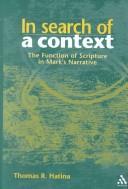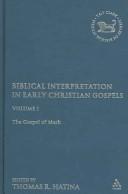| Listing 1 - 6 of 6 |
Sort by
|

ISBN: 0826460674 9780826460677 Year: 2002 Volume: 232 8 Publisher: Sheffield Sheffield academic press
Abstract | Keywords | Export | Availability | Bookmark
 Loading...
Loading...Choose an application
- Reference Manager
- EndNote
- RefWorks (Direct export to RefWorks)
In this book the author explores how contexts determine the meaning of embedded scripture texts in the Gospel of Mark. Many historical critics base their readings on a context that is external to Mark+ås story world, be it a reconstructed socio-religious setting of the evangelist, a Jewish exegetical tradition or some earlier stage in the development of the gospel. What is common to these readings is the neglect for the context of the story world- the very context in which scripture quotations and allusions are embedded. The author proposes a method of reading these embedded texts that is sens
Bible --- Criticism, interpretation, etc --- 226.3 --- Evangelie volgens Marcus --- Bible. N.T. Mark -- Criticism, interpretation, etc. --- Religion --- Philosophy & Religion --- Christianity --- Bible. --- Marco (Book of the New Testament) --- Mark (Book of the New Testament) --- Markus (Book of the New Testament) --- Markusevangelium --- Vangelo di Marco --- Criticism, interpretation, etc. --- Book of Mark

ISBN: 0567080676 9780567041944 9780567033093 9780567684158 0567041948 9780567684141 9780567684110 0567684156 0567033090 9780567080677 Year: 2010 Volume: 304, 310, 376, 613 Publisher: London Clark
Abstract | Keywords | Export | Availability | Bookmark
 Loading...
Loading...Choose an application
- Reference Manager
- EndNote
- RefWorks (Direct export to RefWorks)
This volume is the fourth in a set of volumes, which together explore current approaches to the study of scripture in the Gospels. Thomas R. Hatina's latest edited collection begins with an introduction surveying methodological approaches used in the study of how scriptural allusions, quotations, and references function in John, with subsequent essays grouped into four categories that represent the breadth of current interpretive interests. The contributors begin with historical-critical approaches, before moving to rhetorical and linguistic approaches, literary approaches, and finally social memory approaches. Each study contains not only recent research on the function of scripture in John, but also an explanation of the approach taken, making the collection an ideal resource for both scholars and students who are interested in the complexities of interpretation in John's context as well as our own. --
Apocryphal Gospels. --- 226.2 --- Evangelie volgens Matteüs --- 226.3 --- Evangelie volgens Marcus --- 226.4 --- Evangelie volgens Lucas --- Apocryphal Gospels --- 226.5 --- 226.5 Evangelie volgens Johannes --- 226.5 Evangile de S. Jean --- Evangelie volgens Johannes --- Evangile de S. Jean --- Gnostic Gospels --- Gospels (Apocryphal books) --- Non-canonical Gospels --- Apocryphal books (New Testament) --- Bible. --- Jean (Book of the New Testament) --- Johanisi (Book of the New Testament) --- Johannesevangelium --- John (Book of the New Testament) --- Yohan pogŭm --- Yohane den (Book of the New Testament) --- Yūḥannā (Book of the New Testament) --- Evangelie (Book of the New Testament) --- Fukuinsho (Books of the New Testament) --- Gospels (Books of the New Testament) --- Gospels, Synoptic (Books of the New Testament) --- Synoptic Gospels (Books of the New Testament) --- Ba-yon Tipan --- Bagong Tipan --- Jaji ma Hungi --- Kainē Diathēkē --- New Testament --- Nouveau Testament --- Novo Testamento --- Novum Testamentum --- Novyĭ Zavet --- Novyĭ Zavi︠e︡t Gospoda nashego Īisusa Khrista --- Novyĭ Zavit --- Nuevo Testamento --- Nuovo Testamento --- Nye Testamente --- Perjanjian Baru --- Dhamma sacʻ kyamʻʺ --- Injīl --- Criticism, interpretation, etc. --- Ioganaĭ (Book of the New Testament) --- Иоганай (Book of the New Testament)
Book
ISBN: 3657796215 Year: 2023 Publisher: Paderborn : Ferdinand Schöningh, Brill Deutschland,
Abstract | Keywords | Export | Availability | Bookmark
 Loading...
Loading...Choose an application
- Reference Manager
- EndNote
- RefWorks (Direct export to RefWorks)
Why are conceptions of afterlife so diverse in both Jewish and Christian antiquity? This collection of essays offers explanations for this diversity through the lens of social memory theory. The contributors attempt to understand how and why received traditions about the afterlife needed to be altered, invented and even forgotten if they were to have relevance in the present. Select ancient texts conveying the hopes and fears of the afterlife are viewed as products of transmission processes that appropriated the past in conformity with identity constructs of each community. The range of literature in this collection spans from the earliest receptions of Israelite traditions within early Judaism to the Patristic/Rabbinic period.
Theology and World Christianity. --- Philosophy of Religion. --- Future life. --- Religion --- Philosophy
Book
ISBN: 9780567533968 9780567654717 Year: 2013 Publisher: London Bloomsbury
Abstract | Keywords | Export | Availability | Bookmark
 Loading...
Loading...Choose an application
- Reference Manager
- EndNote
- RefWorks (Direct export to RefWorks)
Theology, Doctrinal --- Bible. --- Theology.
Book
ISBN: 8024632152 9788024632155 9788024632018 Year: 2018 Publisher: Praha
Abstract | Keywords | Export | Availability | Bookmark
 Loading...
Loading...Choose an application
- Reference Manager
- EndNote
- RefWorks (Direct export to RefWorks)
Book
ISBN: 9789004693180 9004693181 9789004695146 Year: 2024 Publisher: Leiden: Brill,
Abstract | Keywords | Export | Availability | Bookmark
 Loading...
Loading...Choose an application
- Reference Manager
- EndNote
- RefWorks (Direct export to RefWorks)
This major collection of essays by senior colleagues and friends of Craig A. Evans recognizes his contribution to the field of biblical studies by concentrating upon his areas of research and writing interest. These include: the emergence and characteristics of early Judaism, Jesus and the apostolic tradition, and a variety of other supporting areas in New Testament studies. These essays include both focused studies and challenging theoretical explorations.
| Listing 1 - 6 of 6 |
Sort by
|

 Search
Search Feedback
Feedback About UniCat
About UniCat  Help
Help News
News